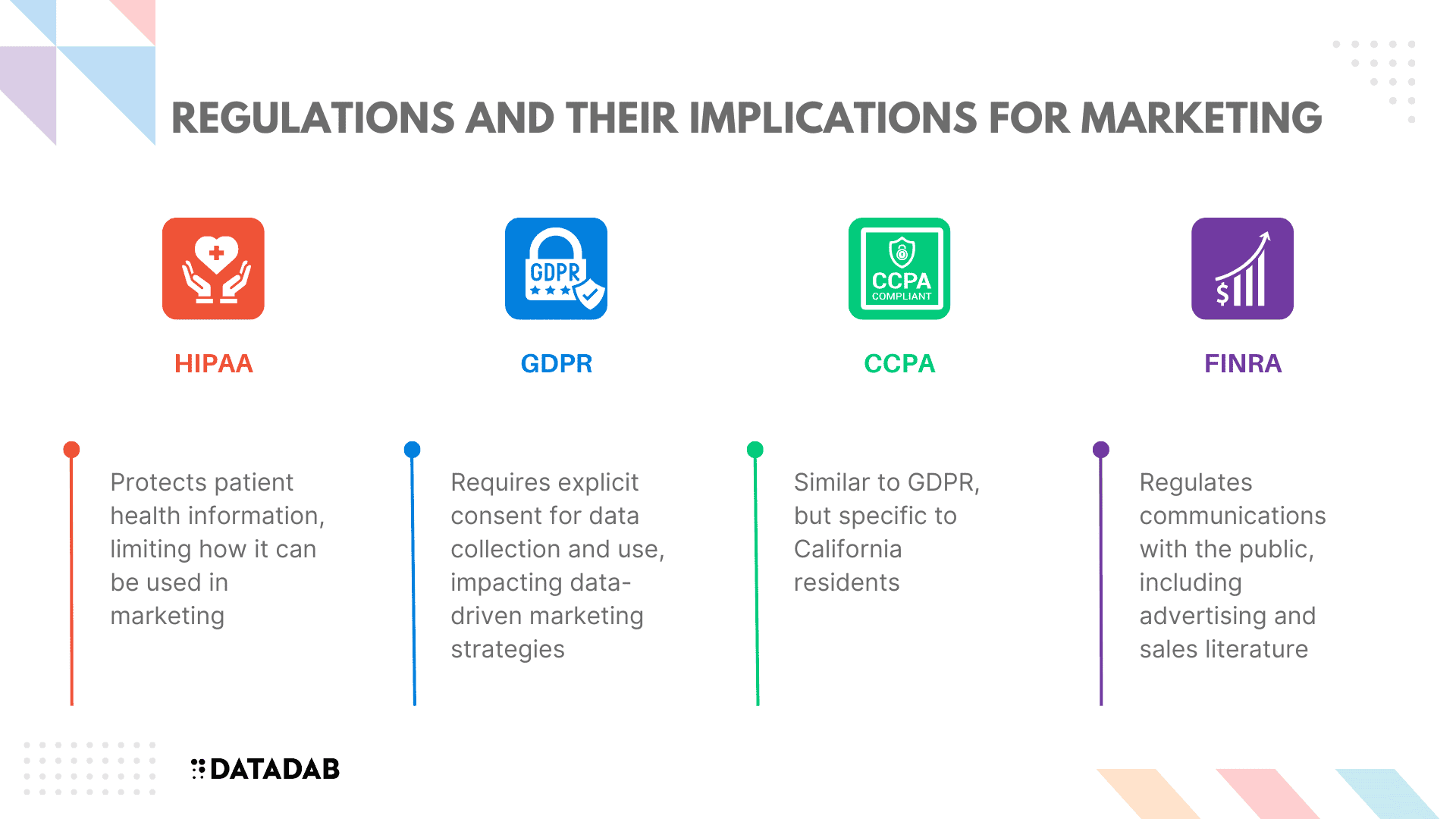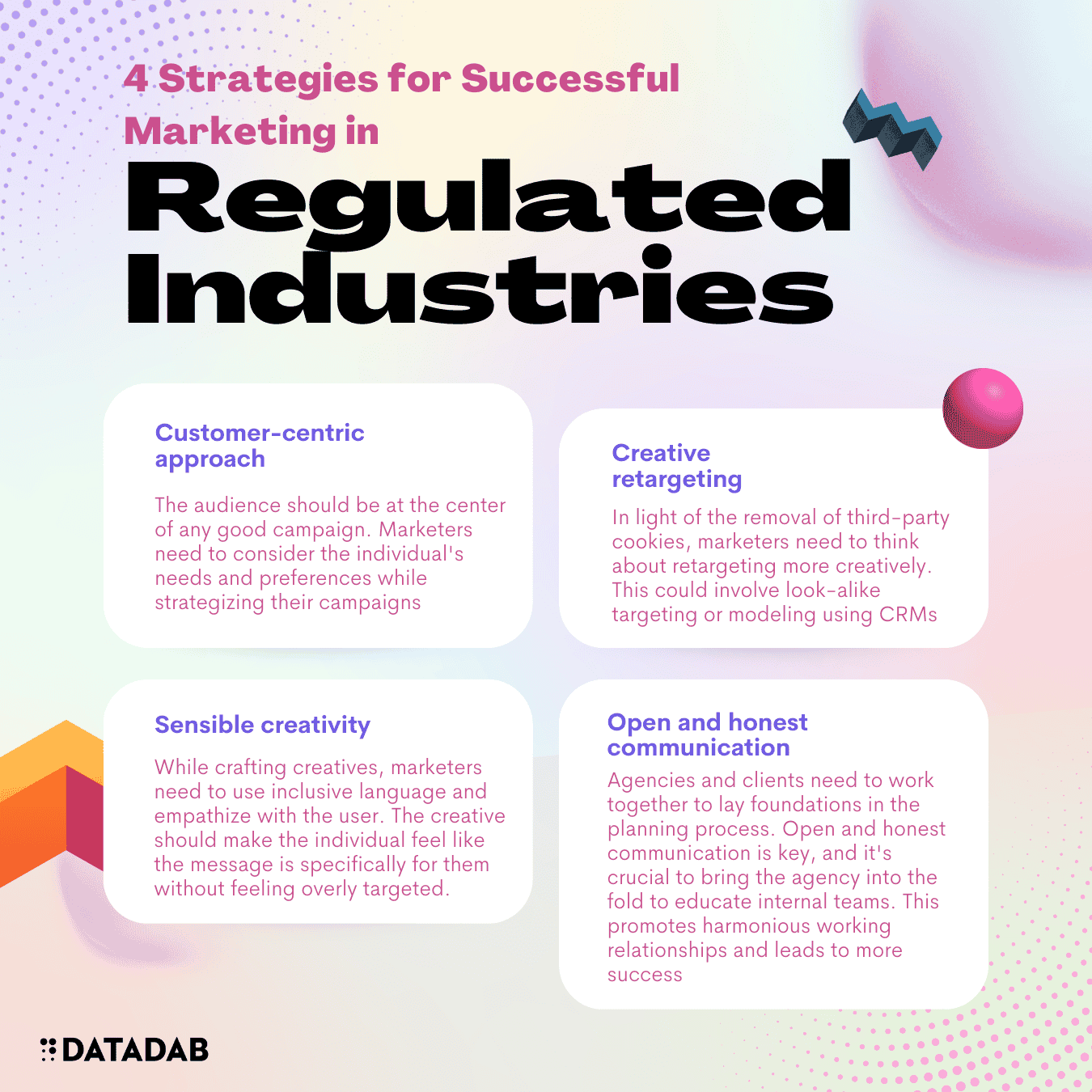"In regulated industries, the strongest marketing tool isn't persuasion, it's education."
I know firsthand that marketing in a highly regulated industry can feel like navigating a minefield. As someone who has worked in healthcare marketing (as an agency owner) for years, I've constantly had to balance creativity with strict rules around what can and cannot be said. It's frustrating when regulations restrict what feels like a brilliant idea or campaign.
But over time, I've learned that these constraints can actually spur creativity and force you to connect with customers in a transparent, helpful way. The core is not flashy gimmicks but building real trust through valuable education.
In this guide, I want to share the marketing strategies I've picked up that allow you to effectively promote your product while fully respecting industry regulations. These are tips that have worked for me and my team when we’ve felt limited by the rigid rules we operate under. I’ll cover how to deeply understand the regulatory landscape, make trust-building central to your messaging, collaborate across teams, leverage helpful tech tools, and more.
My goal is to show you that marketing in regulated spaces is very possible with the right thoughtful approach. Those limitations that feel restrictive can actually provide helpful guardrails if you embrace them fully. So let’s dive in!

This doesn't mean it's an insurmountable task. On the contrary, it's an exciting opportunity to demonstrate your creativity, your understanding of the landscape, and your ability to communicate effectively within the constraints.
This guide will help you navigate the complexities of marketing in these industries, offering strategic insights, actionable tips, and concrete examples. So put on your thinking cap, grab a cup of coffee, and let's get down to business.
Understanding the Regulatory Landscape
First things first, let's talk about the regulatory landscape. In highly regulated industries, it's crucial to fully understand the rules, regulations, and laws that govern your marketing activities. This isn't just about avoiding fines or lawsuits - it's about building trust with your audience.
Think of it this way: your customers, more than anything, need to trust that you are respecting their needs, their privacy, and their rights. In industries like healthcare and finance, this is not just a customer preference - it's a legal requirement.
Building Trust: The Core of Your Marketing Strategy
In a world where data breaches are almost commonplace, consumers are more skeptical than ever. They want to know that their data is safe and that the companies they deal with are transparent, ethical, and, above all, trustworthy. In fact, according to the 2021 Edelman Trust Barometer, 81% of consumers must be able to trust the brand to do what is right.

Tailoring Your Messaging: Speak Their Language
Once you have a solid understanding of the regulatory landscape and have made trust-building a priority, it's time to craft your messaging. This is where your creativity comes into play.
A Lesson from the Pharmaceutical Industry
Let's take a look at a real-world example. Pharmaceutical companies operate in one of the most heavily regulated industries. Yet, they've found ways to effectively market their products without running afoul of the regulations.
One way they've done this is by focusing on education. Instead of making bold, unverifiable claims about their products, they provide valuable, educational content to their audience. They work to educate doctors, patients, and caregivers about diseases, treatment options, and the science behind their products.
Navigating Social Media: A Double-edged Sword
Social media is a powerful tool for marketers, but it can be a minefield in regulated industries. Missteps can lead to regulatory fines, damaged reputations, and loss of trust. However, if used correctly, it can be a valuable platform for connecting with your audience and sharing valuable content.
Using Technology to Your Advantage
In the era of digital transformation, tech tools can be a great ally. From compliance software that helps you stay on top of regulations, to AI-powered tools that can vet your content for compliance issues, there are a plethora of tools available to assist you.
Fostering Collaboration: Sales and Marketing Unite
In a highly regulated industry, it's critical that your sales and marketing teams are aligned. Both teams need to understand the regulations and work together to ensure all customer-facing communications are compliant.
Creating a Culture of Compliance
Finally, creating a culture of compliance within your organization is crucial. This goes beyond simply following the rules - it's about fostering an environment where compliance is valued and prioritized.
Wrapping Up
Marketing in a highly regulated industry may be challenging, but it's far from impossible. By understanding the regulatory landscape, making trust-building a priority, tailoring your messaging, leveraging technology, fostering collaboration, and creating a culture of compliance, you can not only navigate the challenges but also thrive in your industry.
Remember, the goal is not to sidestep the regulations, but to embrace them, and use them as a guide to create ethical, effective marketing strategies that resonate with your audience and build trust.
Here's to your success in navigating the exciting world of product marketing in highly regulated industries.
FAQ
What makes marketing in highly regulated industries different?
Marketing in highly regulated industries differs from typical marketing because of the additional layer of regulations that marketers must adhere to. This means they not only have to follow standard marketing and advertising laws, but also specific regulations that govern their industry, such as healthcare, finance, or CBD. The challenge here is finding a balance between achieving marketing goals and complying with these regulations.
Why is building trust important in marketing for highly regulated industries?
Trust is paramount in highly regulated industries. These industries often deal with sensitive consumer data, and how they use that data can significantly impact consumer relationships. By being transparent about data practices and implementing robust data protection measures, companies can build trust with their customers. This is especially important in industries where the audience might be more vulnerable due to their health or financial situations.
How can I tailor my messaging for a highly regulated industry?
Tailoring your message in a highly regulated industry involves understanding your customers' needs and preferences and considering their sensitivities. This is particularly important when dealing with sensitive data. For example, a healthcare company should avoid using personal health information to target ads in a way that reminds individuals of their illnesses. Instead, it should strive for a balance of being tactful and retargeting carefully to protect people's right to privacy.
What can we learn from the pharmaceutical industry about marketing in regulated industries?
The pharmaceutical industry offers valuable lessons on how to market products in a regulated environment. One key lesson is the importance of creating educational content. This not only helps inform consumers about your products but also builds trust by demonstrating that your company prioritizes customer education and awareness. Collaborating with experts in the field can further enhance the credibility of your content.
How can I use social media effectively while navigating regulatory compliance?
Social media can be a double-edged sword in regulated industries. While it provides an opportunity to reach and engage with a large audience, it also opens up risks of non-compliance with regulations. To navigate this, develop a comprehensive social media policy that outlines what can and cannot be posted on your company's social media profiles. Regularly train your team on how to use social media effectively and compliantly.
What role does technology play in managing regulatory compliance in marketing?
Technology can be a significant asset in managing regulatory compliance in marketing. Compliance software can help you manage and track regulatory compliance, saving time and effort. Additionally, AI-powered tools can review marketing materials for potential compliance issues before they are published, helping to avoid costly mistakes.
How can sales and marketing teams collaborate effectively in a highly regulated industry?
Effective collaboration between sales and marketing teams is critical in a highly regulated industry. Hold regular meetings to discuss strategies, goals, and regulatory updates. Develop shared goals that reflect the need for regulatory compliance. Foster an environment of open communication where team members can discuss issues and concerns related to compliance.
How can I foster a culture of compliance within my organization?
Fostering a culture of compliance involves regular training for your entire team, not just your marketing department. It's also important to celebrate compliance successes to reinforce the importance of compliance and motivate your team to continue prioritizing it. Furthermore, open and honest communication is crucial, as is setting realistic goals and expectations about what success looks like in a regulated industry.
Can I use influencer marketing in a highly regulated industry?
Yes, you can use influencer marketing, but it comes with its own set of
challenges. It's crucial to ensure that any influencer you work with understands the regulations of your industry and adheres to them in their content. This means providing them with clear guidelines on what they can and cannot say about your product or service. Additionally, any relationship between your company and the influencer must be disclosed to comply with FTC guidelines.
What is the role of a compliance officer in marketing in a regulated industry?
A compliance officer plays a crucial role in marketing within a regulated industry. They are responsible for ensuring that all marketing activities adhere to relevant laws and regulations. This includes reviewing and approving marketing materials before they are published, providing training to the marketing team on compliance issues, and staying up-to-date with any changes in regulations that could affect marketing activities. In many cases, the compliance officer will work closely with the marketing team to develop strategies that are both effective and compliant.






